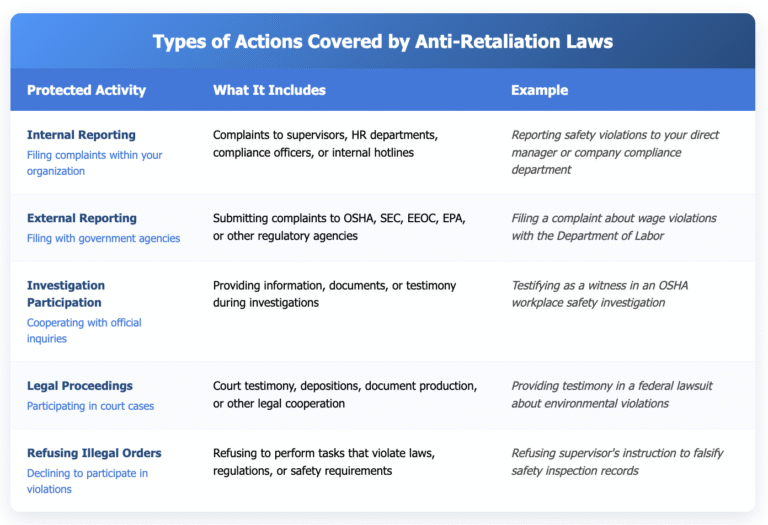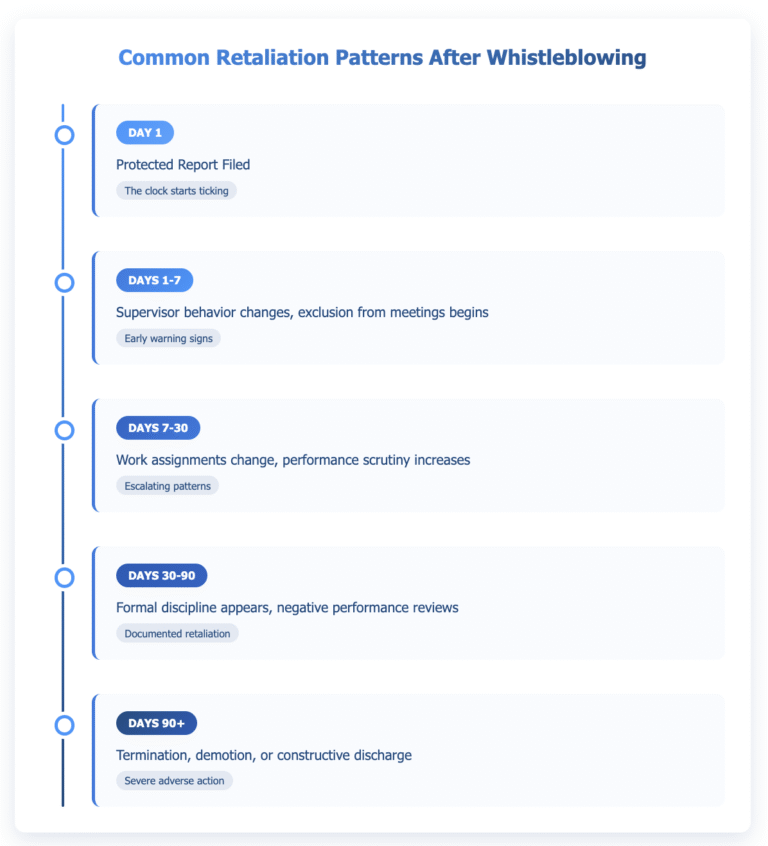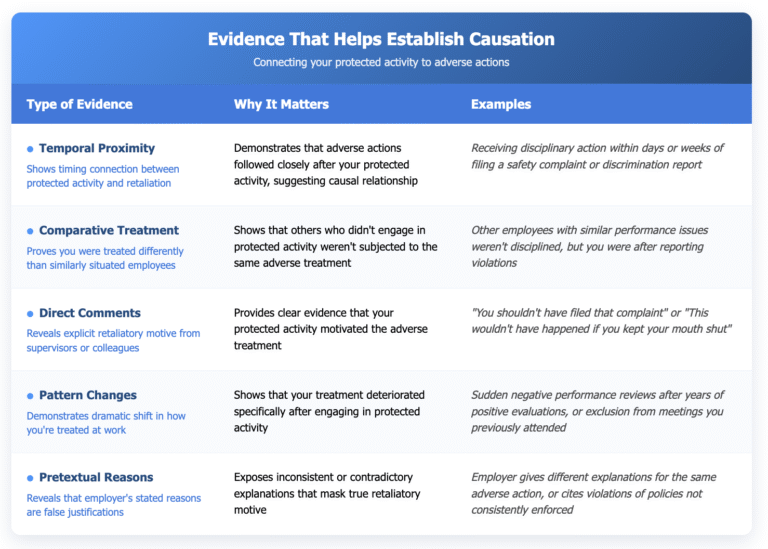You’ve witnessed something wrong at work—fraud, safety violations, discrimination, or illegal practices—and you know you need to report it. But you’re worried about one thing: what happens to you after you speak up?
This concern is completely valid. Retaliation against whistleblowers is unfortunately common, but here’s what you need to know: federal and state laws provide robust protections against punishment for reporting wrongdoing. Understanding these protections can mean the difference between staying silent out of fear and confidently doing the right thing while keeping your career intact.
Let’s walk through exactly how these anti-retaliation laws work, what actions they prohibit, and how you can use them to protect yourself when reporting violations.
Disclaimer: This article provides general information for informational purposes only and should not be considered a substitute for legal advice. It is essential to consult with an experienced employment lawyer at our law firm to discuss the specific facts of your case and understand your legal rights and options. This information does not create an attorney-client relationship.
What Anti-Retaliation Laws Actually Protect
Anti-retaliation protections don’t just prevent your employer from firing you after you blow the whistle. They’re much broader than that, covering virtually any negative action taken because you reported wrongdoing.
The core principle is simple: if you engage in legally protected activity (like reporting violations), your employer cannot punish you for it. Protected activities typically include:
- Reporting violations to government agencies
- Filing internal complaints about illegal conduct
- Participating in investigations or proceedings
- Refusing to participate in illegal activities
- Testifying in legal proceedings related to violations

Federal Anti-Retaliation Framework
Multiple federal laws include anti-retaliation provisions, each tailored to specific industries or types of violations. The key is knowing which law applies to your situation.
Sarbanes-Oxley Act (SOX)
Covers publicly traded companies and their contractors. If you report financial fraud, securities violations, or shareholder fraud, SOX prohibits retaliation through termination, demotion, harassment, or any other adverse action.
The timeline is crucial: you have 180 days from when the retaliation occurs to file a complaint with OSHA. SOX cases often involve complex financial misconduct, making documentation essential.
Occupational Safety and Health Act (OSH Act)
Protects employees who report workplace safety and health violations. This law has an extremely short deadline—you must file within 30 days of the retaliatory action.
The OSH Act covers situations like reporting unsafe working conditions, refusing to work in dangerous situations, or filing safety complaints with OSHA.
Environmental Whistleblower Protections
Various environmental laws (Clean Air Act, Safe Drinking Water Act, Toxic Substances Control Act) include anti-retaliation provisions. These typically give you 30 days to file complaints with OSHA.
Environmental retaliation cases often involve complex technical violations, making expert documentation and testimony important.
Dodd-Frank Act
Provides protections for reporting securities law violations, with complaints filed directly with OSHA. You have 180 days to file, and the law includes strong remedies, including double back pay in some cases.
How Employers Typically Retaliate (And How Laws Address It)
Retaliation rarely looks like a manager saying, “You’re fired for reporting violations.” Instead, it’s usually more subtle, which is why anti-retaliation laws cast a wide net.

Subtle Forms of Retaliation
Performance-Based Retaliation: Suddenly receiving negative performance reviews after years of positive feedback, being held to different standards than colleagues, or having your work subjected to unusual scrutiny.
Social Retaliation: Being excluded from meetings, having colleagues instructed not to work with you, or experiencing a hostile work environment from management.
Economic Retaliation: Reduced hours, eliminated overtime opportunities, passed over for promotions, or having benefits modified.
Constructive Discharge: Making working conditions so intolerable that you feel forced to quit. Courts recognize this as equivalent to termination under anti-retaliation laws.
Proving Retaliation: The Legal Framework
To succeed in a retaliation claim, you generally need to establish three elements. Understanding this framework helps you document your case effectively.
Element 1: Protected Activity
You must show that you engaged in activity protected by law. This is usually straightforward—filing a complaint, reporting to an agency, or refusing illegal orders clearly qualifies.
The key is timing: document exactly when you engaged in protected activity, because you’ll need to connect it to subsequent adverse actions.
Element 2: Adverse Action
The employer took some negative action against you. This doesn’t have to be termination—any materially adverse action counts.
Courts look at whether the action might deter a reasonable employee from engaging in protected activity. Even actions that don’t affect pay or job status can qualify if they’re sufficiently harmful.
Element 3: Causal Connection
This is often the most challenging element. You must show that your protected activity contributed to the adverse action.

State-Level Protections: Often Stronger Than Federal
Many states provide whistleblower protections that are broader than federal laws, with longer filing deadlines and expanded coverage.
New York State Whistleblower Protections
New York Labor Law Section 740 protects employees who report violations of laws, rules, or regulations. Key advantages include:
- Applies to all employers, regardless of size
- Covers violations of any law, rule, or regulation
- Requires only that you have a “reasonable belief” that violations occurred
- Allows direct filing in state court (no administrative exhaustion required)
California Whistleblower Protections
California’s whistleblower statute is among the most protective, covering reports of suspected violations to government agencies or in internal compliance processes.
California also prohibits retaliation for refusing to participate in activities that would violate state or federal law, even if you’re mistaken about the legality.
Remedies Available for Retaliation Victims
Anti-retaliation laws provide significant remedies designed to make you whole and deter future violations.
Reinstatement and Back Pay
Most laws allow courts to order your employer to rehire you if you were terminated, restore you to your original position if you were demoted, and pay you for lost wages and benefits.
Back pay calculations include not just salary, but also bonuses, raises you would have received, and benefits like health insurance contributions.
Compensatory Damages
Many laws allow recovery for consequential damages—expenses you incurred because of the retaliation. This might include job search costs, therapy expenses for stress-related conditions, or medical bills.
Some statutes specifically allow emotional distress damages, recognizing that retaliation often causes significant psychological harm beyond economic loss.
Punitive Remedies
Several whistleblower statutes include punitive elements:
- Double back pay: Sarbanes-Oxley provides for double back pay in some cases
- Attorney’s fees: Most whistleblower statutes allow recovery of legal costs
- Liquidated damages: Some laws provide automatic damage multipliers
Documentation Strategies That Strengthen Your Protection
The strength of your anti-retaliation claim often depends on how well you document both your protected activity and subsequent adverse treatment.
Checklist: Essential Documentation for Retaliation Claims
□ Initial Report Documentation
- Copy of complaint filed with the agency or internal report
- Receipt confirmations or filing timestamps
- Email confirmations of submissions
- Names of people you reported to
□ Performance History
- Previous performance reviews (especially positive ones)
- Awards, commendations, or recognition
- Email praise from supervisors
- Documentation of raises or promotions
□ Post-Report Treatment Changes
- New negative feedback or criticism
- Changed work assignments or responsibilities
- Exclusion from meetings or communications
- Different treatment compared to colleagues
□ Comparative Evidence
- How others were treated for similar conduct
- Whether discipline was consistent with past practice
- Documentation of similar violations by others
- Evidence of disparate treatment
□ Timeline Documentation
- Detailed chronology of events
- Dates of all interactions with management
- Progression of adverse treatment
- The connection between protected activity and negative actions
Strategic Considerations for Different Industries
Financial Services
SEC and CFTC programs offer significant financial rewards but have specific procedural requirements. Financial industry employees should be particularly careful about confidentiality restrictions and securities law compliance.
Timing is crucial in financial cases—market conditions and regulatory priorities can affect both agency interest and potential awards.
Healthcare
Healthcare whistleblowing often involves patient safety or Medicare/Medicaid fraud. These cases may implicate multiple regulatory frameworks and often involve complex medical evidence.
Healthcare professionals should be aware that licensing board complaints might accompany retaliation, requiring coordination between different types of legal representation.
Government Contracting
False Claims Act cases involving government contractors often provide the strongest financial incentives but require an understanding of complex procurement regulations and contract terms.
Security clearance implications can complicate retaliation cases for government contractors, requiring specialized legal analysis.
When to Seek Legal Representation
While you can file retaliation complaints without an attorney, legal representation often significantly improves outcomes, especially in complex cases.
Early consultation is particularly important when:
- Multiple laws might apply to your situation
- Your employer is a large corporation with significant legal resources
- The violations involve complex technical or financial issues
- You’re considering internal reporting but want to understand external options
- You’ve already experienced some adverse treatment after reporting
What to Expect from Legal Representation
A qualified employment attorney will:
- Analyze which laws provide the strongest protections for your specific situation
- Help you document your case effectively before filing
- Navigate complex procedural requirements and deadlines
- Coordinate between different agencies if multiple laws apply
- Negotiate with your employer for appropriate remedies
- Represent you in administrative proceedings or court if necessary
Taking Action: Your Next Steps
If you’re experiencing retaliation for reporting wrongdoing, don’t wait. Anti-retaliation laws have strict deadlines, and evidence can disappear quickly.
Immediate priorities:
- Document everything: Start keeping detailed records of all adverse treatment
- Preserve communications: Save emails, text messages, and written communications
- Know your deadlines: Research the specific filing deadlines for laws that apply to your situation
- Avoid escalating conflicts: Don’t give your employer additional reasons for adverse action
- Seek legal guidance: Consult with an attorney experienced in whistleblower retaliation cases
Remember: Anti-retaliation laws exist because lawmakers recognized that protecting whistleblowers serves the public interest. You have a right to report wrongdoing without suffering career consequences, and the law provides significant tools to enforce that right.
The decision to report violations is never easy, but understanding your anti-retaliation protections can give you the confidence to do what’s right while protecting your livelihood.
If you’re facing retaliation for reporting wrongdoing or considering making a protected disclosure, contact Nisar Law Group for a confidential consultation. Our employment law attorneys can help you understand your specific protections, navigate complex procedural requirements, and pursue appropriate remedies for any retaliation you’ve experienced.


